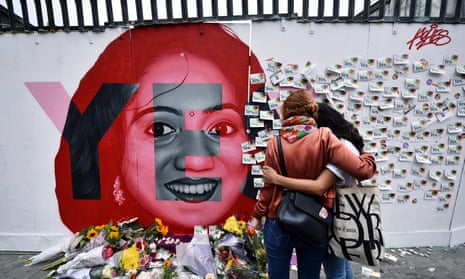The father of Savita Halappanavar, the 31-year-old dentist who died of sepsis in 2012 after being denied an abortion during a protracted miscarriage, has said he is “very happy” at the result of Ireland’s referendum.
Speaking to the Guardian by phone from his home in Karnataka, south-west India, Andanappa Yalagi said: “We’ve got justice for Savita, and what happened to her will not happen to any other family now.
“I have no words to express my gratitude to the people of Ireland at this historic moment.”
Last week he told the Guardian that his daughter’s death had devastated the family. “It’s still very emotional after five years. I think about her every day,” he said.
As it became clear on Saturday that Ireland had voted overwhelmingly to reform its restrictive abortion regime, flowers and messages were left at a mural created by street artist Aches in Dublin last week to commemorate Halappanavar.
Ian Jennings, 24, said: “I’ve come down here specifically to say sorry to the women of Ireland and women like Savita that we let down.
“For decades in this country we turned women away, hid them and we shamed them and our generation has decided that we are never going to do that again.”
One message taped to the wall read: “I’m sorry. I hope this absolves our country’s guilt.”
Another note said: “Your death started me on this journey to repeal the eighth. Today I stand proud of our country as we managed to do that. You will never be forgotten and I’m so sorry we couldn’t help you. My yes was for you.”
Rosita Sweetman, 70, a founder member of the women’s movement in Ireland, said: “It feels like the end of hundreds of years of repression by the Catholic church. It’s such a huge change.”
Linda Cummins, 60, said: “I’m feeling a bit emotional and happy and relieved that this has been taken out of the constitution.
“I think Savita was kind of iconic, she focused us on what this actually meant for women and what was really happening and it was just such a terrible, avoidable tragedy.”
Halappanavar’s death was a catalyst for the movement to repeal the eighth amendment. An independent inquiry into her treatment found there had been an “over-emphasis on the need not to intervene until the foetal heart had stopped”, as well as poor patient monitoring and risk assessment. It strongly recommended that the Irish parliament consider changing the law, and “any necessary constitutional change”.
Prof Sir Sabaratnam Arulkumaran, who chaired the investigation, last week called on voters to back the repeal of the clause, saying it tied doctors’ hands.
Halappanavar was admitted to University hospital in Galway on 21 October 2012, when she was 17 weeks pregnant with her first child. Medical staff concluded that a miscarriage was inevitable but did not intervene – despite requests from Halappanavar and her husband for an abortion – as a foetal heartbeat could be detected.
A few days later, medics diagnosed infection as a result of ruptured membranes and, later septic shock. Halappanavar died on 28 October.
In media interviews in the following weeks, Praveen Halappanavar said he and his wife had repeatedly asked for the pregnancy to be terminated after her admission to hospital, but they had been told: “This is a Catholic country”.
Thousands of people took part in candlelit vigils and protests across Ireland, calling for changes to allow women to have access to legal abortions. An inquest jury returned a unanimous verdict of medical misadventure.
Praveen Halappanavar, who has left Ireland, has not spoken publicly about his wife’s death since an out-of-court settlement was agreed shortly before a medical negligence case was due to open at Ireland’s high court in 2016.









